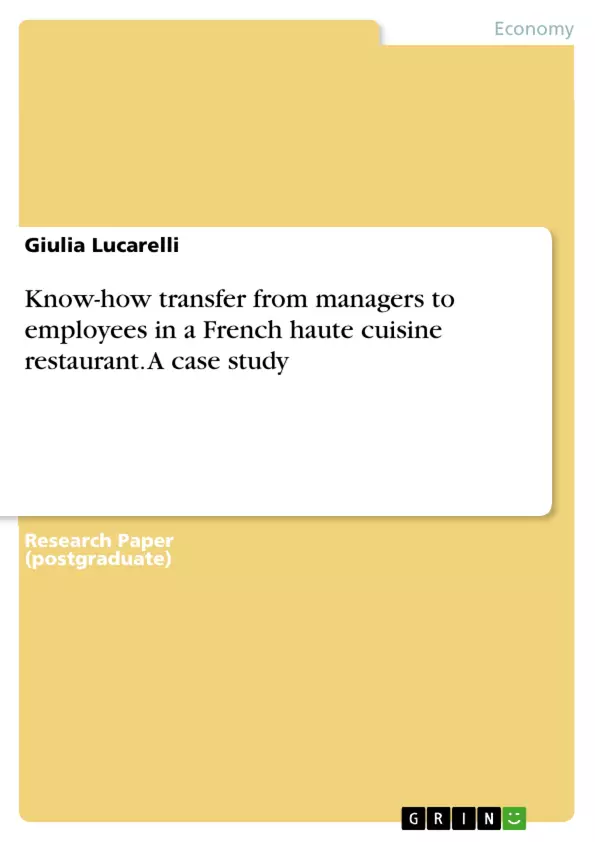The aim of this paper is to analyze how a change in the manager's know-how influences the collective production know-how of the considered organization. The case study taken into consideration is an haute cuisine French restaurant. A longitudinal study has been performed within eight years. During these years, three head chefs took over each others’. The individual knowing of each of them influenced in a different way the collective production know-how development. Hence, this paper after a short presentation of the case, analyzes in detail how each set of the different head chefs’ individual knowing have impacted the establishment of shared practice and the consequential change in the production know-how growth.
Inhaltsverzeichnis (Table of Contents)
- Abstract
- Introduction
- Research Question
- Literature Review
- Discussion and Analysis
Zielsetzung und Themenschwerpunkte (Objectives and Key Themes)
This research paper aims to analyze how the change in the individual knowledge of the head chef impacts the collective production know-how within a high-end French restaurant. The study focuses on a longitudinal analysis over eight years during which three head chefs led the kitchen, each with distinct individual knowledge and approaches to managing the kitchen staff.
- The influence of a head chef's individual knowledge on collective production know-how.
- The role of tacit knowledge and its transfer within an organization.
- The impact of different leadership styles on knowledge creation and sharing.
- The importance of a learning organization approach for competitive advantage.
- The relationship between absorptive capacity and knowledge transfer mechanisms.
Zusammenfassung der Kapitel (Chapter Summaries)
- Abstract: Introduces the research question, focusing on the impact of head chef changes on collective production know-how in a high-end French restaurant. The study spans eight years and observes three different head chefs.
- Introduction: Provides context by describing the high-end French restaurant as a case study, emphasizing the importance of high-quality food and the Michelin star rating. The restaurant's hierarchical kitchen structure is outlined.
- Research Question: Formulates the research question: How does a change in the individual knowledge of the head chef influence the collective production know-how within the considered organization?
- Literature Review: Discusses competitive advantage, know-how, learning organization, and knowledge transfer. The SECI model and Ferdows' framework for knowledge transfer are introduced.
- Discussion and Analysis: Analyzes the study case using frameworks introduced in the Literature Review. Examines how the three head chefs' different approaches and individual knowledge influenced the speed of production know-how development and knowledge transfer.
Schlüsselwörter (Keywords)
This paper centers around the concepts of individual and collective know-how, tacit knowledge, production know-how, learning organizations, knowledge transfer, and absorptive capacity.
Frequently Asked Questions
How does a head chef's individual knowledge affect a restaurant's production?
The study shows that changes in a manager's individual know-how significantly influence the collective production know-how and practices of the kitchen staff.
What is the importance of tacit knowledge in haute cuisine?
Tacit knowledge, which is difficult to formalize, is crucial for high-quality food production and is transferred through shared practice and experience.
How long was the longitudinal study performed?
The study was conducted over an eight-year period, observing the transitions between three different head chefs.
What is the "SECI model" mentioned in the literature review?
The SECI model is a framework for understanding how knowledge is created and transferred within an organization through socialization, externalization, combination, and internalization.
How does leadership style impact knowledge sharing in a kitchen?
Different leadership styles of the three head chefs impacted the speed of know-how growth and the establishment of shared practices among the staff.
- Quote paper
- Giulia Lucarelli (Author), 2015, Know-how transfer from managers to employees in a French haute cuisine restaurant. A case study, Munich, GRIN Verlag, https://www.grin.com/document/307981



